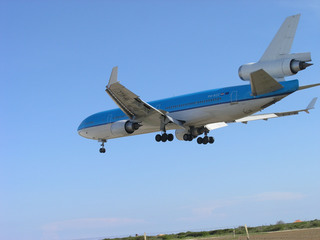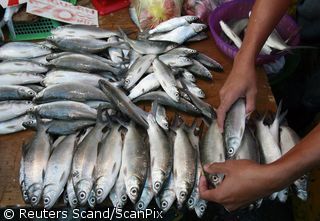For several years the position of Polish exporters on the markets of the former Commonwealth of Independent States has been clearly weakening
Published:
5 May 2003 y., Monday
In order to spur on trade, presentations of Polish exporters are gaining popularity. One such presentation is the Polish National Exhibition in St. Petersburg.
Geographic proximity, relatively small competition from local manufacturers who are not capable of satisfying the growing demand for modern products and, contrary to common belief, the increasingly wealthy and demanding customer, are the advantages of the "eastern market." Why then does trade with the countries of the Commonwealth of Independent States (CIS) constitute as little as 7.1 percent of the global value of Polish export?
The position of Polish companies is weakened by competition from the Western businesses that are perfectly aware of the perspectives which an active and strategically planned entry into Eastern markets can accomplish. Entrepreneurs from Germany, France and the United States, supported by the appropriate funds, first promote and then successfully sell their products in Russia and Ukraine or make direct investments there.
The decrease in the amount of Polish agriculture and food products exported to Eastern markets has stemmed from the fact that big international concerns such as Nestlé, Danone or Unilever directly entered this strategic area. However, the issue of Western competition is only a part of the answer to this question and the possibility of development for Polish exporters on the markets in the former Soviet Union.
One of the most serious difficulties Polish companies encounter is a considerable risk connected with signing commercial contacts with partners from the East who frequently appear to be insolvent and do not honor their contracts. According to Robert Stawski from the Promotion Chamber of the Polish Chamber of Commerce, businesspeople from Russia frequently do not understand the term "advance payment" and sometimes want to pay for the products only after they sell them. For obvious reasons, these terms are hard to accept for Polish manufacturers, which are mostly small and medium-sized companies. The state does not guarantee any protection for companies against situations in which partners from Russia, Belarus or Ukraine do not fulfill the terms of a commercial contract.
Šaltinis:
warsawvoice.pl
Copying, publishing, announcing any information from the News.lt portal without written permission of News.lt editorial office is prohibited.
The most popular articles
 The European Commission has today decided to close the formal investigation procedure into the agreement between Bratislava Airport in Slovakia and Ryanair after concluding that the airport operator acted as a market economy investor and therefore no advantage has been granted to Ryanair.
more »
The European Commission has today decided to close the formal investigation procedure into the agreement between Bratislava Airport in Slovakia and Ryanair after concluding that the airport operator acted as a market economy investor and therefore no advantage has been granted to Ryanair.
more »
 The coffee industry of Jamaica represents one the largest earners of foreign exchange, approximately US$30 million in 2008.
more »
The coffee industry of Jamaica represents one the largest earners of foreign exchange, approximately US$30 million in 2008.
more »
 On January 13, 2010, the Executive Board of the International Monetary Fund (IMF) concluded the Article IV consultation with Mauritius.
more »
On January 13, 2010, the Executive Board of the International Monetary Fund (IMF) concluded the Article IV consultation with Mauritius.
more »
 The World Bank's International Development Association and the International Monetary Fund have agreed to support US$1.6 billion in debt relief for the Islamic Republic of Afghanistan.
more »
The World Bank's International Development Association and the International Monetary Fund have agreed to support US$1.6 billion in debt relief for the Islamic Republic of Afghanistan.
more »
 The Common Agricultural Policy plays a critical role in helping farmers to deliver environmental goods and services, provided that policies are targeted in the right way.
more »
The Common Agricultural Policy plays a critical role in helping farmers to deliver environmental goods and services, provided that policies are targeted in the right way.
more »
 Regional Policy Commissioner Paweł Samecki will meet Croatia's Prime Minister Jadranka Kosor and members of her government in Zagreb on 25-26 January to discuss the country's preparations for accession in the context of the EU cohesion policy.
more »
Regional Policy Commissioner Paweł Samecki will meet Croatia's Prime Minister Jadranka Kosor and members of her government in Zagreb on 25-26 January to discuss the country's preparations for accession in the context of the EU cohesion policy.
more »
 The World Bank Board of Directors today approved US$20 million for the Dominican Republic in support of the Municipal Development Project, which aims to improve the technical and financial capacity of local governments.
more »
The World Bank Board of Directors today approved US$20 million for the Dominican Republic in support of the Municipal Development Project, which aims to improve the technical and financial capacity of local governments.
more »
 The European Investment Bank (EIB) is lending EUR 400 million to Ford Romania SA for the expansion and refurbishment of the company’s existing car assembly plant located in Craiova in the South-West of Romania.
more »
The European Investment Bank (EIB) is lending EUR 400 million to Ford Romania SA for the expansion and refurbishment of the company’s existing car assembly plant located in Craiova in the South-West of Romania.
more »
 The Agriculture Council of the European Union has examined ways to improve the functioning of the food supply chain with the ultimate aim of controlling the fluctuation in prices and ensuring a more equitative distribution of the added value throughout the chain.
more »
The Agriculture Council of the European Union has examined ways to improve the functioning of the food supply chain with the ultimate aim of controlling the fluctuation in prices and ensuring a more equitative distribution of the added value throughout the chain.
more »
 The European Commission has today approved an application from Lithuania for assistance under the Globalisation Adjustment Fund (EGF).
more »
The European Commission has today approved an application from Lithuania for assistance under the Globalisation Adjustment Fund (EGF).
more »